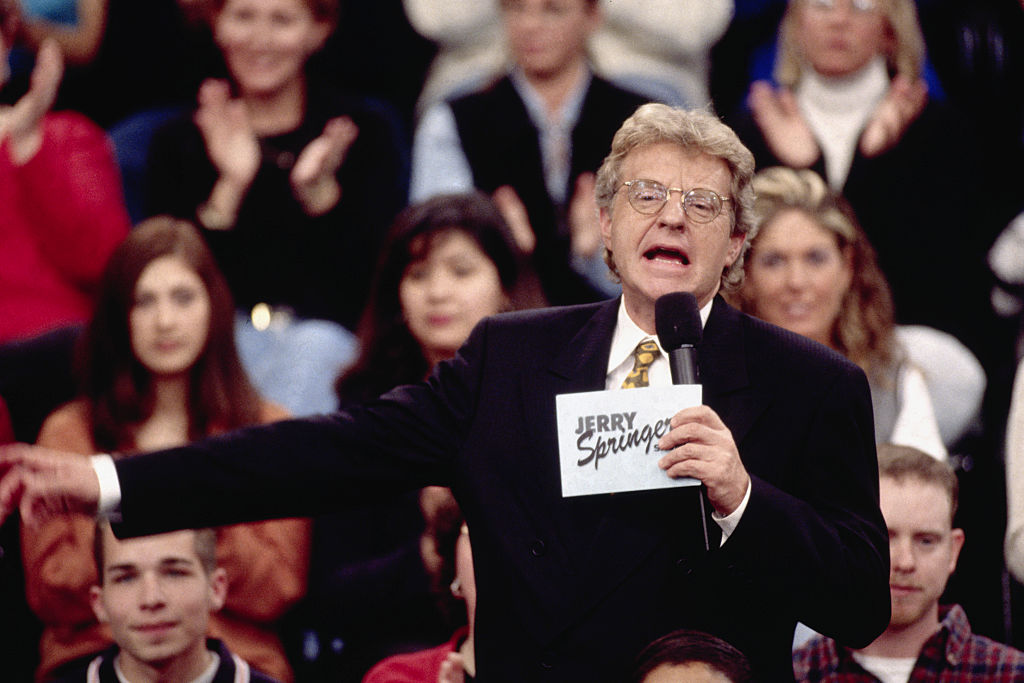Fights broke out all the time on The Jerry Springer Show, the NBC talk show that ran from 1991 to 2018, where guests went on to discuss their deepest, darkest secrets and confront their biggest enemies.
But the drama that played out on TV was only half the story. In the two-part documentary, Jerry Springer: Fights, Camera, Action, out Jan. 7 on Netflix, former producers reveal what went into creating the show and how they primed guests for those fights. Springer died in 2023, and none of them have a bad word to say about him. But there is so much trash-talking among the producers about how the show was run, it’s surprising that a fight doesn’t break out in the docu-series itself.
[time-brightcove not-tgx=”true”]
Here’s a look at the juiciest tidbits about what went into the making of The Jerry Springer Show.
The goal of The Jerry Springer Show
Springer, a former news anchor who served as the mayor of Cincinnati from 1977 to 1978, initially wanted to host a serious show and had dreams of running for Congress. Instead of becoming a politician, he became a subject of politicians’ inquiries: Jerry Springer includes footage of a Chicago city council hearing into the violence of the show.
The docu-series argues that the sensational tone of the show can be traced back to its Executive Producer Richard Dominick, who worked at tabloids like Weekly World News and the Sun before he became The Jerry Springer Show showrunner from 1994 to 2008. Under Dominick’s tenure, ratings went through the roof. Guests included a man who cut off his own penis and a man who left his wife and two daughters and married a horse.
Dominick appears in the series and has no regrets about his approach. As he explains, “Life is hard,” and weird news “takes you away from your world.”
Annette Grundy, one of the producers under Dominick, says that the aim was to put together a program that would catch people’s eye even with the sound turned off.
Why there were so many fights on The Jerry Springer Show
When the show first started out, it was pretty tame. Springer would interview guests like a teenager excited about going to college. Then Dominick was hired, and he knew those softball interviews were not going to get the kind of high ratings that the networks wanted.
Producers say they got marching orders to make sure guests got into fights after an explosive 1997 episode called “Klanfrontation,” in which members of the Ku Klux Klan got into a brawl with Irv Rubin, the founder of the Jewish Defense League. The KKK members had just been initiated into the Klan, and the point of the episode was to see if they could give up their allegiance to the Klan before they got in too deep.
After this episode, show producers focused on setting up more explosive arguments through the guests.
Show guests were initially treated like royalty, shuttled to the studio in a limousine. When they got to the studio, the producers would coach them on what to say on air and try to get them worked up. In Jerry Springer, one guest recalls receiving drink tickets and being encouraged to get drunk.
In Jerry Springer, there is footage of producers doing mock interviews with guests in which they are literally screaming at them. One named Toby Yoshimura recalls, “I would throw the door open to the dressing room, pick up a chair, throw it across the green room and start screaming.” Footage of his mock interview with a guest shows him calling her a “meth-head piece of s***.” As he explains what he was trying to do, “you’re starting a s***-fight. You rev them up to tornado level and then you send them out on stage.”
As for Springer’s approach to the show, he once described the difference between himself and the popular TV show host Oprah Winfrey by saying, “she does a real talk show. I don’t do a talk show. I do a circus. There are just no lions.”
Springer viewed the show as a place to “demonstrate outrageousness,” he says in archival footage included in the docu-series. He always maintained that all opinions deserve to be heard, no matter how out-there they are.
“In a free society, the media should reflect all elements of that society, not just the mainstream. On our show, for example, we have Klansmen on, we have neo-Nazis on—they killed my family,” Springer, the son of Holocaust survivors, says in another interview shown in the series. “I hate these people. I hate what they stand for. I may hate what you say, but I’ll fight to the death for your right to say it.”

